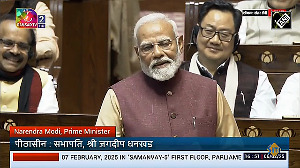The Reserve Bank of India's recommendation on the fuller capital account convertibility appears to have been overshadowed by the recommendation on the P-notes.
P-notes are a very important instrument through which, a lot of foreign money flows into the Indian markets. Any suggestion to phase it out is seen to have adverse impact on the markets' sentiments.
However, there are many other recommendations in this report other than the one on the P-factor. The report has also suggested lowering the government's stake in the PSU banks and allowing greater capital flows from foreign institutional investors in debt, from NRIs into the capital market, from companies for investing overseas.
CNBC-TV18 looks at all these issues with CAC Committee member, AV Rajwade, and Rajiv Malik of JP Morgan.
Excerpts from CNBC-TV18's interview with AV Rajwade and Rajiv Malik:
The one recommendation, which has created the most controversy to which the ministry of Finance this morning says that they are unwilling or not very keen on accepting that is your recommendation on participatory notes? Could you tell us why did you recommend that this be phased out and whether all members of the committee were fully aware of the ramifications of such a recommendation?
Rajwade: If you have read the report, one of the points on which I have dissented with the committee is very specifically on the issue of P-notes. The committee has recommended that the P-notes should be banned. But Dr Bhalla and I have disagreed with the majority recommendation. We have both placed our dissents, which are part of the report.
Our view was that there are a lot of genuine investors, who also come through the P-note route either because for one technical reason or another, they cannot get registered as FIIs or that they may not wish to go through the hassles of doing so. So there are genuine investors, who would like to follow the P-note route.
There are suspicions that some resident Indians use that route to round trip money, it gets transferred from here and comes back through the FII route. It is quite possible that the avenue is being used by some people.
But in our mind if they are violating the law, then there are other ways of catching them. So my dissent was that the P-note should not be banned. Also because the Lahiri committee went into it in some detail only recently and the Lahiri committee recommendations should be followed.
Who were the members who were pressing for this P-note ban if you could tell us and despite the dissent between the two of you why was it taken up as a final recommendation then and what were the concerns, which were highlighted?
Rajwade: To try and say who was pressing and who was not pressing, I do not think that would be a right way of looking at it. You have a list of the members of the committee, two have dissented and the other four have agreed. I imagine that their worries about the P-notes route being used by resident Indians were probably more than those of the others who dissented.
Even so what was the premise on which they thought that P notes should actually be banned; and was the committee aware of the ramifications it might have on sentiments across markets and even investors?
Rajwade: I should imagine that the committee members are knowledgeable enough to know that what the repercussions are.
One word on the broader roadmap that has been set out in terms of fiscal consolidation as well?
Rajwade: Looking at each phase and each part of the recommendation is a difficult exercise in the kind of time limit within which we are discussing the whole issue.
The first point which should be noted is that committee was appointed to look at fuller convertibility on capital account. Now as we all know fuller is something less than full. So I think that is sort of one point that needs to be kept in view that the committee was asked to recommend a roadmap for fuller convertibility not full convertibility.
That is an important point, which was based on the terms of reference itself and that needs to be kept in view.
One more point on the recommendation that the government holding in PSU banks be brought down to 33%, what did the members feel about the practicality of that and whether the government would be willing to do that and how important was that in the overall context of moving towards CAC?
Rajwade: One of the segments of the economy most vulnerable to free movement of capital would be the banking system. The fear was that there is a lot of interference in the autonomy of the banking system.
One example of that we recently saw was the suggestion that the interest rate hike should be reviewed and so on and so forth.
These kinds of things impinge on the autonomy of the banking sector. The autonomy will be there only when government doesn't have a majority shareholdings but less than majority.
Also going back, at one point of time, a few years back during the earlier governments time it was announced as a policy decision that government would like to bring down the shareholding to 33%. So it is not something totally new.
That has gone on the backburner lately because of the opposition to any kind of divestments or privatisation from some of the allies of the present government. But that was there earlier and was very much on the agenda. It was one way of making sure that the banks run in an autonomous fashion in the interest of all stakeholders.
Your first thoughts on the entire furore that has been raised over P-Notes?
Malik: It is a valid objection although I have to say that one should not have expected anything different from the committee. Do not forget when the Lahiri report came out, the RBI actually made dissenting noises. It should have been highly unlikely that there would have been review of that and the RBI would start thinking that P-Notes were necessarily good things.
The whole debate misses the basic point that what is a way forward. Most likely outcome is going to be maintaining status quo. The RBI will continue to indicate its lack of preference for P-Notes and ministry of finance will continue to say that they are okay with it.
As far as investors are concerned, they really do not know which way to go. So it is more important that the MoF (Ministry of Finance) and the RBI at some level find a solution to the issue and put it out in the open.
Are we moving towards capital account convertibility and in your discussions or deliberations with the other committee members did it come out that the preconditions which you set out are actually contingent on the movement towards capital account convertibility which means if they fall into place only then you actually go ahead and implement it?
Rajwade: I would not really term them as preconditions for everything. What the committee has envisaged in terms of the report is that both these things would go hand in hand. Greater liberalization on the capital account would need to go hand in hand with the strengthening of the banking system, the strengthening of the finances of the central government and other issues.
So I would not feel that there are very specific preconditions in relation to specific majors or steps.
One would expect that both would go in parallel, the liberalization side on one hand, the strengthening of the system, strengthening of the fiscal system and the banking system on the other.
Do you want to comment on the fiscal deficit target, the inflation target that this committee report has set out?
Malik: Those are very valid points although I have to totally agree with Mr. Rajwade that there do not have to be necessarily some kind of preconditions. It has to be a symbiotic and ongoing process.
The problem, however, with something like that is that lot of stuff never gets done. So for a committee, that's trying to recommend a roadmap, has to put in place either some of the risks or some of the conditions that should be met.
That doesn't that all of them have to be met before any progress is made on capital account liberalization. Also do not forget the whole capital account liberalisation is not a single step process. It is a series of steps. Just as in the past some steps have been made even though the preconditions were not made, the same is likely to be true even in the future.
Your specific observations on the few recommendations, which pertain to greater capital or allowing greater capital flows from FIIs in debt, from NRIs into the capital market, from companies for investing overseas anything which you particularly like or dislike?
Malik: Some of the steps are quite refreshing. Trying to do away with the differentiation between non-resident Indians and other kind of non-resident investors is a welcome sign that India has come of age.
Implicitly by making that recommendation, the committee inadvertently is acknowledging that India is in a totally different light today. There was a time when we were so very dependent on hard currencies from NRIs.
The recommendations pertaining to increasing limits on investment in a variety of domestic financial assets are welcome. I still find the overall thrust to be gradualist, incrementalist in nature, which perhaps has to be the case given the fact that there are a lot of other uncertain variables in the equation.
But I do not think anyone should have expected a big bang liberalisation suggestion from this committee. The critical issues really are in some of the specific recommendation. For example, I did not expect them to come out any differently on P-Notes. But the way they have come out perhaps is a lot stronger than I would have anticipated.
As someone who was on that committee and a part of all these recommendations, are you a bit disappointed that all the focus seems to have gone to the P-Notes?
Rajwade: I think yes. P-Notes is just one part of the totality. As I have already said, there was no unanimity on P-Notes and that is very apparent in terms of the dissent notes.
But probably the focus has gone there because that is one issue, which has direct impact or could have potentially a direct impact in terms of the stock market, as I believe that something like 50% of the FII money, which is coming in is in the form of P-Note investors.
Now that is fairly large chunk of the money that is coming in. Obviously that issue has repercussions for what happens in the stock market and therefore that was the issue probably, which has attracted more immediate attention than many of the other issues.
For instance, a point on which I have dissented is on freedom for non-residents to invest in the rupee bond market, both G-Sec and corporate. I think that is a very major issue. But the one, which has caught the attention, is P-Note mainly because the issue is directly related to what happens in the stock market.
Do you also get a sense from these committee reports that Reserve Bank of India probably is dragging its feet in terms of reforms in the banking system? It seems suggest that we do not want foreign banks just yet, let's see what we can do internally first and then come to the issue of foreign banks and giving them greater access. Is that the feeling, which comes out?
Malik: Not from this particular committee report. Do not forget banking sector liberalisation was not necessarily one of the key points that this committee had to dwell upon.
But RBI has already come out with its banking sector reform plan. It has clearly disappointed a lot of people that it was moving a lot slower than what a lot of investors would have thought.
One thing perhaps to be said in the RBI's favour is the state of some of the state banks. At the end of the day, it is always a Central Bank that's left holding a lemon, if something goes wrong.
From that perspective, it has to have a fairly conservative approach. Having said that I think both the RBI and the government need to reach a consensus as to how best can they move forward in a much more accelerated manner.
At least on the banking sector side with roadmap already out there, it is difficult for me to think why the RBI all of a sudden would revise that and make a much faster progress on that front.
So on lots of these issues, the CAC convertibility report was a good case in point. I do not think markets should have expected anything table pounding. I do think there are some valid positive recommendations that have come out, which clearly have been sidelined because of the whole P-Notes issues, which was unfortunate but there was really no need to expect a table thumping recommendation.






 © 2025
© 2025